“It’s a rotten collusion”
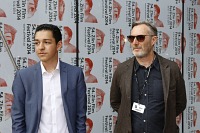 In the vigorous social drama LEAVE TO REMAIN two Afghan asylum seekers in England forge an alliance. Timid shepherd boy Abdoul is taken under the wing by Omar, a natural leader among the boys in the asylum centre. To secure their future, there’s only one thing that counts: a good story is the best way towards a permanent residence. But what if the stories of Abdoul and Omar collide with another?
In the vigorous social drama LEAVE TO REMAIN two Afghan asylum seekers in England forge an alliance. Timid shepherd boy Abdoul is taken under the wing by Omar, a natural leader among the boys in the asylum centre. To secure their future, there’s only one thing that counts: a good story is the best way towards a permanent residence. But what if the stories of Abdoul and Omar collide with another?
In Zlin young actor Masieh Zarrien (Abdoul) and director Bruce Goodison, explained about LEAVE TO REMAIN’s broader context: “The film is only the tip of the iceberg.”
 Bruce Goodison: The process of making the film was as important as the film itself. I worked with 20 people, all going through an asylum procedure. As a filmmaker, for them I somehow represented a ‘formal authority’, which made it more difficult to win their trust. My experience as a documentary filmmaker taught me: give people as much support as possible to speak, and overtime they will start sharing a great deal more.
Bruce Goodison: The process of making the film was as important as the film itself. I worked with 20 people, all going through an asylum procedure. As a filmmaker, for them I somehow represented a ‘formal authority’, which made it more difficult to win their trust. My experience as a documentary filmmaker taught me: give people as much support as possible to speak, and overtime they will start sharing a great deal more.
While following them around to the home office, doctor’s meetings etc. I took notes upon which I based my script. Everything happening in the film happened in the lives of those young people, with the use of drama as a ‘protective coat’.
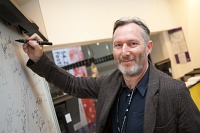 Besides a script, you also needed a cast.
Besides a script, you also needed a cast.
Goodison: Again, this was part of a bigger process. I started a school where we did drama and short film making. Over 5 Easter and summer holidays, we recruited children who all got involved in the film as actors or behind the scenes. This emotional authenticity we mixed with the input of professional actors, like Noof Ousselam (playing Omar) who comes from Edinburgh.
Masieh Zarrien: His accent was more exotic and harder to understand than my Farsi.
The film starts with a ceremonious statement: Omar making a speech for a group of officials. What effect did you want to generate?
Goodison: Showing the ‘public face’ of the asylum seeker. Omar is facing a typical audience: well-wishing liberal professionals, raising money. I’ve been there, listening to those speeches and I tell you: it’s a trade. “I give you my story of hardship, and you give me your money.” It’s a rotten collusion. We filmed that scene in a place called ‘The Liberal Club of Pall Mall’, in the heart of England’s colonial institutions… A perfect setting.
Then Abdoul enters. You don’t make it exactly easy for us to like him.
Zarrien: Abdoul had to be played in a specific way: very quiet, he wouldn’t socialise, he can’t be charming or loud. He doesn’t give you anything to make you become his friend.
Goodison: That’s how it is in real life: the charismatic types get all the help. Boys like Abdoul, coming from farmer villages, without education or charm, they fall through the cracks. He is simply not ‘attractive’ enough. In the entire film, he smiles only twice. He is too young to know how to play the game of a victim.
Zarrien: Too young? Many boys in the workshop told me they were only 18, but they had 2 children and a full grown beard.
Goodison: They also look older because of life’s hardships.
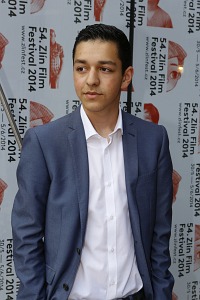 Masieh, how did you get involved?
Masieh, how did you get involved?
Zarrien: I’m a European citizen from Afghan origin, born in Holland and living in the UK. I couldn’t read Farsi – I had a voice coach to help getting a proper accent. At the age of 10 I was playing on my Xbox all the time at home, so my mum sent me to Paiwand, an Afghan organisation giving supplementary schooling. I went to a workshop with my cousin, he had high expectations, while I was just driven by boredom… until I saw all the free food! I felt kind of happy in those workshops, and I kept on going there.
Toby Jones (INFAMOUS, HARRY POTTER) plays the role of a committed teacher, working a bit ‘on the edge’.
Goodison: His character is based on a real teacher who gave up his job in a city school because he wanted to do something more meaningful. He is now dedicated to educational welfare, using his teaching skills to teach ‘life skills’. As the flawed and kafka-esque system is entirely stacked against the asylum seeker, case workers like him will do everything in their power not to have those boys sent back, relying on human rights laws.
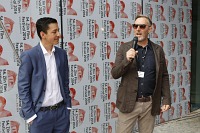 At one point the whole group goes on a mountain trip. Where were those scenes shot?
At one point the whole group goes on a mountain trip. Where were those scenes shot?
Zarrien: In Wales. It was so cold there! I was wearing six layers of clothing and still it felt like my toes would freeze. We spent 6 days in those tough conditions. The scene with the sheep was the worst: they were running up and down the hillside, trying to escape, and all the time it was snowing. Terrible!
I thought it was a particularly wise decision not to show flashbacks from the boys’ earlier lives back in the home country. Were you ever tempted to shoot them?
Goodison: I hate flashbacks! They’re pointless. But you’ll find some auditory flashbacks on the sound reel. For instance in the sound of a truck, you can hear bomb explosions and jets flying over. Karl Mainzer is an extraordinary sonic wizard, creating an emotional landscape with sound. He made his mix with enormous sophistication, which is quite unusual for this kind of film. It’s like the sound of a fantasy film transported to a piece of social realism.
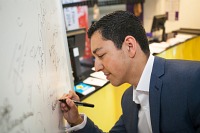 What about the music?
What about the music?
Goodison: Alt-J is Britain’s biggest indie hype. Their debut album, combining folk music with an urban sound, won every possible award in 2012. Some songs from the soundtrack are included on their new album.
Zarrien: They played ‘Warm Foothills’ live at the Reading Festival.
The film is somehow gender-related. Abdoul and Omar are young boys. If you would tell the stories of the girls in the group, the film would become almost unbearably cruel.
Goodison: Like the story of Zizidi who is escaping personal prosecution. In this new culture she discovers her femininity and starts to blossom. She takes off her scarf, which is a big thing to do. Zizidi tries things out, like every teenager. But through the experiences of a friend, she realises that gaining freedom can only come at a price, and she returns to her faith.
 You smuggle a bit of humour into the film, for instance in the scenes when the group has to perform a Christmas play.
You smuggle a bit of humour into the film, for instance in the scenes when the group has to perform a Christmas play.
Goodison: Even when working with a strong political motivation, it is important to make the audience laugh. Showing Zizidi in the role of the Virgin Mary, you could call that ‘subtly subversive’.
Zarrien: Me too, I once had to do a Christmas play at school. I was one of the Three Kings.
Goodison: Which is hilarious, but on the edge of being wrong.
Zarrien: It’s a good scene tough. We laughed so much while shooting it.
Did you come across other aspects of western life that turned out particularly ‘exotic’ for these refugees?
Zarrien: In primary school I was in class with Sikhs, Hindus… Although we had a day off on all public holidays, we never had a holiday for other religious festivities. I found that very strange.
Goodison: Our society is a melting pot of faiths. The majority of London citizens are not Christian. All this could make England much more colourful and more interesting.
Gert Hermans
